Presentation |
Key message |
>Top 1. Prologue:
- The report of NGO Conference in Beijing 2007 was reported at Glocom Platform, International Univ. of Japan on Sept.19, 2007. The seminar tittle was "Japan's NGOs under Globalization."
- Active questions were raised among Japanese and foreging audience who participated at the seminar.
- Discussion:
- Color revolution
- Another step to a developed country
- IT-empowered activities of NGOs
|
>Top 2. Snapshots at the conference:
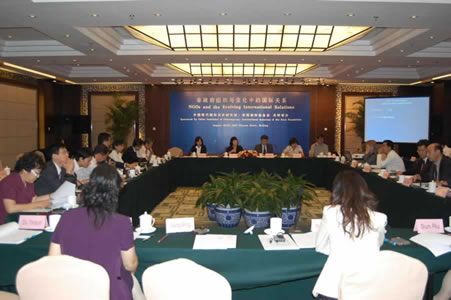
|
- All participants at the conference, except me (the photographer)
- My seat was the third of the right desks.
- Bold and flexible discussion about world NGO/NPO activities in Beijing
|
>Top 3.
Snapshots in Beijing streets:
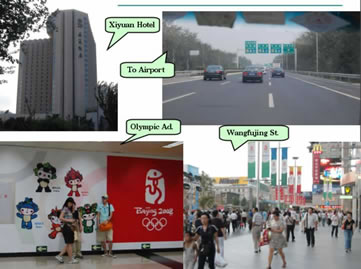
|
- Several snapshots in Beijing city; very active preparing for 2008 Olympics in Beijing.
- The hotel held the conference was Xiyuan Hotel located western district of Beijing.
- There was a tapestry containing "a three-leg crow living in the sun" in the hotel.
- There was a crowd in Wafujing St. as the previous year of Beijing Olympics. Also many new subway lines were under construction in various places.
|
>Top 4. The frist day's schedule (Aug. 30):
- The first day schedule of the conference.
- I made the presentation-2, with the title of "Functions and Issues of NPO/NGO of Japan."
- Cosponsored by the Ford Foundation, and
China Institutes of Contemporary International Relations. (CICIR)
- Schedule (Aug 30): AM
- Presentation-1: “NGOs’ status and role in international politics”
- Prof. Gao Zugui ( 高祖貴) , Deputy Director, Institute of Security & Strategic Studies, CICIR
- Presentation-2: “Functions and Issues of NPO/NGO of Japan”
- Kanzo Kobayashi, Fellow, GLOCOM, IUJ
- Presentation-3: “NGOs in Europe”
- Dr. Gurun Wacker, SWP, Germany
- Presentation-4: “NGOs in the developing countries”
- Prof. He Xiquan, Deputy Director, Institute of Asian & African Studies, CICIR
- Commentators:
- Prof. Feng Zhongping, Director, Institute of European Studies, CICIR
- Prof.Lin Limin, Director, Institute of American Studies, CICIR
|
>Top 5.
The second day's schedule (Aug. 31):
- The first day's schedule in the afternoon; comments and discussion.
- Typical interesting discussion between the participants from advanced countries and newly democratized countries.
- Schedule (Aug 30): PM
- Speaker:
- Dr. He Xiquan, Institute of Asia & African Studies, CICIR
Prof. Zhao Liqing (趙黎青) , Professor, Institute of International Strategic Studies, Central Party School
- Dr. Jiang Yi, Institute of Russian, East European and Central Asian Studies, CASS
- Dr. Yuan Peng (袁鵬) , Research Professor, Director, Institute of American Studies, CICIR
- Dr. Wu Hongying (呉洪英) , Research Professor, Director, Institute of Latin American Studies, CICIR
- Commentators
- Prof. Xu Tao (許涛) , Director, Institute of Russian Studies, CICIR
Prof. Li Rong, director, Institute of Asian & African Studies, CICIR
- Ms. Uyaga Myamar, Researcher, Institute for Strategic Studies, National Security Council of Mongolia
- Dr. Nguyen Thai Yen Huang, Institute fo International Relations, Hanoi, Vietnam
- Assist. Prof. Huang Fang (黄放) , Institute of American Studies, CICIR
|
>Top 6.
Presentatiors in Aug.31 am:
- The second day's schedule (Aug. 31).
- In pm, there was an optional tour seeing Great Wall near Beijing.
- Schedule (Aug 31): AM
- Presentation-1: “NGOs in US-China Relations”
- Amb. Julia Chang (張之香) Bloch, President, US-China Education Trust
- Presentation-2: “New Development of NGOs in China”
- Prof. Yang Tuan, Institute of Sociological Studies, CASS
- Presentation-3: “NGOs and Environmental Protection in China”
- Dr. Zhang Haibin,m School of International Studies, Beijing University
- Commentators: PM:
- Prof. Lin Limin, Director, Center for Strategic Studies, CICIR
- Prof. Sun Keqin, Director, Center for Taiwan-related Studies, CICIR
- Conclusion:
- Prof. Yang Mingjie, Assistant President of CICIR
|
>Top 7. Presentatiors in Aug.31 pm:
- Active discussion in the second day, though some scheduled speakers did not participated.
- Schedule (Aug 30): PM
- Speaker:
- Dr. Zvi Shtauber, The Jaffee Conter for Strategic Studies, Tel Aviv University
- Dr. Y.M. Kozhokin, Russian Isnstitue of Strategic Searchings
Prof. Zhao Liquing, Institute of International Strategic Studies, Central Party School
- Dr. Jiang Yi, Institute of Russian, East European and Central asian Studies, CASS
- Commentators
- Prof. Xu Tao, Director, Institute of Russian Studies, CICIR
- Prof. Li rong, director, Institute of Asian & African Studies, CICIR
|
>Top 8. German presentator: Prof. Gurdrn Wacker:
- German professor's report and comments were very impressive and persuasive.
- She well defined the role and function of various NGO, and explained recent activities in EU.
- German Institue for International and Security Affairs, Berlin
- European NGOs:
- Interact with different institutions on EU level
- Political foundations in Germany
- Categories of NGOs:
- Internationally oriented NGOs (funded or have headquarters in Europe)
- Reporters without borders, Transparency International, International Crisis Group, Amnesty International, ATTAC, Human Right Watch
- Local or National NGOs in EU member states. (Eg: Robin Wood)
- Role of NGOs:
- In world politics:
- Shapers of opinion; autonomous actors; competitors to states
- In EU levels:
- Consultation (to country strategy papers);
- Cooperation/Partnership (with regions);
- Operational activities (funding of NGOs);
- Training/Capacity Building for EU officials
|
>Top 9. German presentator: Prof. Gudrn Wacker (2/2):
- Prof. Wacker's continued presentation.
- Topical specialization:
- Environment; (Green 10)
- Human rights; (Human Right & Democracy Network)
- Women; (European Women’s Lobby)
- Social; (Social Platform)
- Development; (European NGO Confederation for Relief & Development)
- Conflict prevention; (European Peacebuilding Liaison Office)
- Networks of NGOs:
- EU Civil Society which brings together 8 large NGO sectors:
- Culture; Environment; Education; Development; Human Rights; Public Health; Social & Women
- A guide for NGOs: http://www.act4europe.org/code/en/default.asp
- EU laws: http://eur-lex.europa.eu/en/index.htm
- Political foundations in Germany:
- Each political party initiated a foundation: (CDP/CSP 225, SDP 222, FDP 61, Left (DSP) 53, Green 51)
- 90% of funding: from state institutions (mainly Min. of Interior, and Min. for Economic Coop.)
- Anglo-Saxon political tradition: funding means control by the state.
- Germany: public funding can be a safeguard against being instrumentalised by private interests.
- 50% for domestic activities; 50% for international activities.
|
>Top 10. Chinese presentator: Prof. Zhao Liquing (1/3):
- Chinese prof. Zhao Liquing friendly and flexible opinions were impressive, though he shares very official position.
- It takes some time for the professor's opinion to be adopted as majority in Chinese government.
- We must continue to show good examples of NGO/NPO activities in the developed countries establishing balanced development of the society.
- Institue of International Strategic Studies, Central Party School
- China’s opening to outside world:
- began in late 1970s.; Unsatisfactory regulatory structure
- Foreign NGOs:
- Laid an initial foundation for activities in China
- It is very important for China to adopt the right attitude and policies towards foreign NGOs, because they can critically affect China’s social development and strongly influence her economic and political development.
- State attitudes to foreign NGOs in China:
- A totally negative view:
- threatening & jeopardizing China’s national security and interests.
- Color Revolutions in Georgia (2003 Rose), Ukraine (2004 Orange), Kyrgyzstan (2005 Lemon, or Tulip); really frightened CCP.
- A totally positive view:
- Angels as altruistic organizations for Chinese people.
- A passive opening up:
- No clear-cut prohibitions on foreign NGOs entering China.
- Relevant laws are inadequate, and some regulations that do exist impose unreasonable restrictions on their legitimate activities. As a result, many foreign NGOs have not registered properly.
- Majority of foreign NGOs in China have no effective supervision.
- Consequently;
- Positive role of foreign NGOs in China is hindered, while the potential negative effects of their activities cannot be guarded against.
|
>Top 11. Chinese presentator: Prof. Zhao Liquing (2/3):
- Continued presentation of Prof. Zhao Liquing
- In recent years:
- State attitudes towards foreign NGOs are gradually moving to positive opening:
- 16th National Conference of CCP (Nov. 2002); openly acknowledged some excellent work done by foreign NGOs.
- A number of laws are being drafted.
- It would mean both encouragement and restrictions.
- China should keep a general open-door policy towards foreign NGOs while being explicit about what it prohibits, restricts and encourages.
- Some activities which may be legitimate and normal in other countries may not be acceptable in China.
- Supporting political dissidents and suppressed people
- Advocating for democracy and human rights
- Engaging in religious activities, etc.
- Fundraising is another area for restriction. (allowed to receive, but not allowed to raise funds publicly, using the media or on the streets, except a few official public organizations, such as China Red Cross, China Charity Federation)
|
>Top 12. Chinese presentator: Prof. Zhao Liquing (3/3):
- Continued presentation of Prof. Zhao Liquing:
- appropriate registration in China
- effective supervision:
- A matter of judgment:
- Engaging in poverty eradication, education, and environmental protection.
- New methods and new mechanism including participation of local grassroots NGOs and Chinese citizens.
- Generating social changes, even economic and political changes as indirect goals.
- Specific and appropriate legist ration:
- Temporary Regulations on Foreign Chambers of Commerce (1989)
- Regulations on Foundations (2004)
- Most foreign NGOs are not governed by laws, having no legal status.
- Effective supervision:
- Dept. of Civil Affairs; NGOs should be obliged to abide by relevant legal requirements and to submit adequate reports. This would enable legitimate activities to be protected and supervised by Chinese Government.
- Dept. of Security of Chinese Government; pursuing any illegal activity.
- Chinese Government should protect legitimate rights and activities of NGOs, establishing a framework that legalizes their existence in China.
- Leaders of foreign NGOs who contribute greatly China’s social development would become close friends of Chinese people:
- Eg: Canadian Norman Bethune; Claire Lee Chennault & his Flying Tigers Team in 20C.
|
>Top 13. American presentator: Ms. Julia Chang Bloch (1/4):
- Wonderful presentation of Mrs. Julia Chang Bloch, an influential Chinese-American in NGO activities, describing:
- Increasdingly active in policy making
- significant increase of budgets of NGOs
- type of functions of NGOs
- as the third sector
- Theme: "NGOs in US - China Relations"
- Increasingly active in policy making and a powerful force to be reckoned with in world politics.
- But there is no accurate calculation of their numbers or scope of activity.
- Their budgets have also significantly expanded.
- Total operating expenditures: $1.6 trillion (2002,by Johns Hopkins Univ.)
- If NPO were a country; 5th largest economy in the world.
- 57% of expenditures: Charity school and hospitals
- 4th World Conference on Women, Beijing in Sept. 1995: 35,000 NGO representatives
- Earth Summit in Rio: 17,000 NGO representatives.
- NGOs still defy definition:
- Human rights; Environmental protection; Humanitarian assistance; Religious organization; Industry associations; Advocates of an endless array of causes.
- Type of functions they perform:
- 1. Charitable social service providers, helping the poor, sick ….
- 2. Provide immediate relief to the victims of war or natural disasters.
- 3. Social activists, mobilizing people power to build pressure on governments, and changes in policies.
- Third Sector:
- “Civil Society” came into fashion in 1980s.
- Virtual industry, accounting for million of jobs and billions of dollars of economic activity.
|
>Top 14. American presentator: Ms. Julia Chang Bloch
(2/4):
- Continued presentation of Mrs. Julia Chang Bloch of US, describing:
- International NGOs as INGOs
- International NGOs today:
- # of INGOs: 6,000 in 1990 →26,000 in 1996 → 37,000 & $2.3B in 2002 (UNDP)
- 1/5 established in 1990s.
- NGOs as non-state actors: emerging influence in the international policy arena.
- Globalization has created both cross-border issues that NGOs address and cross-border communities of interest that NGOs represent.
- Influencing agenda setting, the formulation of policy, its implementation, monitoring and evaluation.
Increasingly, relief and development NGOs receive large grants from governments’ international assistance programs.
- CARE: http://www.care.org/
- Oxfam http://www.oxfam.org/
- Catholic Relief Services: http://www.crs.org/
- Save the Childrent: http://www.savethechildren.org/
- UN High Commissioner for Refugees expressed alarm that governments were increasingly channeling funds for humanitarian assistance to their own national NGOs rather than to multilateral agencies.
- Effectiveness:
- INGOs: more efficient and cost effective than multilateral agencies.
- NGOs now reach 15-20% of the world’s poor; 40% of all healthcare in Africa.
|
>Top 15. American presentator: Ms. Julia Chang Bloch
(3/4):
- Continued presentation of Mrs. Julia Chang Bloch of US describing:
- Art. 71 of UN Charter mentioning about NGOs
- some examples of NGOs' successes
- effective use of the Internet.
- Glowing power of civil society
- Art.71 of UN Charter:
- 2,500 NGOs had consultative status with UN by 2000.
- Some examples of NGOs’ successes:
- Adoption of the Montreal Protocol on Substances Depleting the Ozone Layer in 1987.
- The International Campaign to Ban Land Mines was prime mover in the Mine Ban Treaty of 1997.
- The NGO Working Group on the Security Council emerged as an important interlocutor.
- The Jubilee 2000 Campaign changed thinking and policy on poor countries’ debt.
- Effective use of the Internet:
- Influential international NGO campaign, demanding more just economic policies from WTO, IMF and the World Bank.
- Enabling rapid mobilization of global constituencies; resulted from increasing globalization and the consequent pressure of ordinary citizens to control and regulate the world beyond the nation state.
- Glowing power of civil society:
- Increasingly visible player on the global political scene have become a multibillion-dollar industry.
- NGOs can command great legitimacy, sometimes more than national authorities.
- The Edelman Trust Barometer, a survey of 1,500 global opinion leaders, found that NGOs rank; the biggest jump was in US: “trust ratings” of NGOs soared to 55% in 2005 from 36% in 2001.
- Public trust in NGOs has risen; while public regard for corporate executive & government officials has fallen. (They exploited poor workers abroad and polluted the environment.)
- Multilateral institutions (UN, World Bank) increasing rely on NGOs to assist in the oversight of the projects and programs they support.
|
>Top 16. American presentator: Ms. Julia Chang Bloch
(4/4):
- Continued presentation of Mrs. Julia Chang Bloch of US, referring to:
- Newly democratic countries: though China says herself as a socialist market economy.
- Impact on US-China relation
- ethinic lobbies as a mainstay in US foreign policy
- China's relationship with NGOs in key
- Newly democratic countries:
- At lease 600 Russian NGOs have reportedly been deregistered in a recent government crackdown because of the democratic color revolutions of Ukraine, Georgia and Kyrgyzstan were begun by NGOs.
- In China, economic reform has created new opportunities for citizen participation, particularly in the environmental sector.
- Not unlike Russia, however, Beijing is also wary of NGO activism in China and exercise strict control over NGOs through a range of regulations and restrictions.
- Impact on US-China relations:
- Governments, even in the west, and international organizations at times also find NGOs a nuisance or even a threat to their interests. But activists and their caused have gained increased traction in business, trade, and transnational issues.
- The role of NGOs in US-China, while not decisive, is quite formidable.
- Ethnic Lobbies: a mainstay in US foreign policy:
- Irish americans; Greek lobby; Armenian-american community; American Israel Public Affairs Committee (AIPAC) plays a key role in shaping US policy toward the Middle East.
- More recently, immigrants from India;
- China lobby is more complex. (Recognition in 1979; to win MFN 1986-2000)
- China's relationship with NGOs is key:
- China underestimates the moral power of NGOs and civil society at its peril. The more the Chinese government clamps down to control NGOs, the more damage they will inflict on their own image and reputation abroad.
- China would do far better, like corporations and other governments, to find common ground with NGOs by cooperating on mutual interests, burnishing its own credibility and legitimacy in the process.
|
>Top 17. My presentation at Beijing:
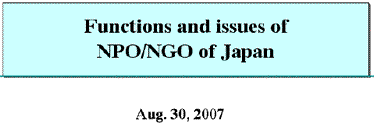
- The title presented at the conference in Beijing.
|
>Top 18. Summary of my presentation:
- The year 1995:
- Activities of NGO/NPO in Japan have drawn attention since commercial use of the Internet and support experience from the Great Hanshin Earthquake.
- Community sector:
- Shift to aging society with less children, to smaller government, and massive retirement of baby boomer generation are making the function of community sector bigger.
- Globalization of Japan:
- Increase of expectation of global NGO/NPO activities contributes more globalization of Japan.
- Problems & challenges:
- There are still various problems & challenges of NGO/NPO in Japan towards transitional period to the informatization society.
|
>Top 19. Association Revolution -1995
- New ways of ODA:
- Assistance for self-supporting development
- In such areas as welfare, environment, culture, human rights.
- Backgrounds:
- Crisis of welfare states since 1970s - 80s.
- Pursue of market-oriented economy
- Disillusions of bureaucratic services.
- Corporatization of social services:
- Nursing care for the old, Health care insurance by private insurance company,
- PPP (Public Private Partnership)
- PFI (Public Finance Initiative) 1999
- Cultivation of NGOs by the government
- Also supporting activities of the Great Hanshin Earthquakes occurred in Jan. 17, 1995 were recognized distinguished one in Japan.
|
>Top 20. The Great Hanshin Earthquake:
- The Great Hanshin Earthquake occurred in Jan. 17, 1995, with its magnitude 7.3, causing 6,434 dead and 43,792 injured, 274,000 housed broken.
- Established as a NPO to remember the disaster, supporting survivors and bereaved families, mental health care, recovery of activities, various culture activities (music, drama, education and sports)
- Fund-raising for similar disasters of earthquake or tsunami, or other serious accidents.
- Publishing and transferring disaster records and surviving know-how.
- Maintenance of various monument of the disaster.
- URL http://www1.plala.or.jp/monument/
|
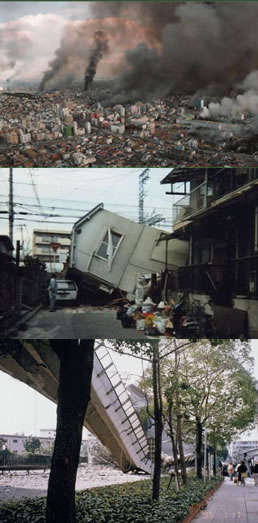 |
>Top 21. Public Debt (% of GDP):
- The ratio of public debt (% of GDP) among advanced countries: Japan is getting very serious of amount of public debt.
- This situation may necessary cause considerable increase of tax (particularly raise of consumption tax), possibly increasing economic gap among people:
- Decrease or non-increase of public fund spending for social activities may giving serious impacts on NPO/NGO.
|
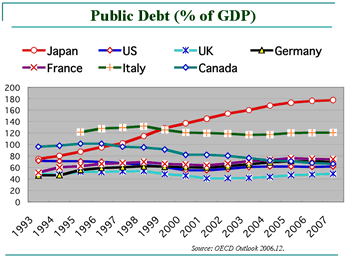 |
>Top 22. Population Pyramid in Japan:
- Problem of "who supports social activities " is getting more serious, as well as deterioration of social pension.
|
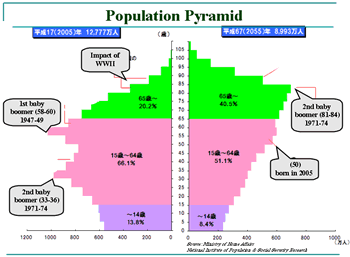 |
>Top 23. Number of foreign residents in Japan
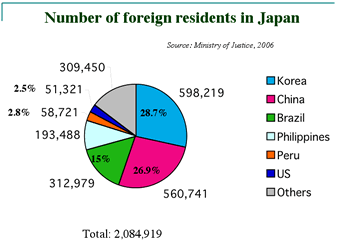 We should consider globalization inside Japan. We should consider globalization inside Japan.- Foreign languages like Korean, Chinese, Portuguese, Spanish other than English are getting important in Japanese society.
|

|
>Top 24. Public/Private/Community sector:
- This is the overall sectors of public, private, and community.
- Globalism belongs to the common area of these three sectors.
|
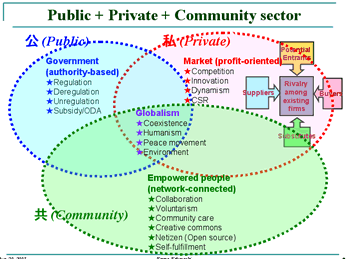 |
>Top 25. Public & Private services:
- Various styles of collaboration of public and private services:
- PFI (Private Finance Initiative) is a new type of collaboration which was recently adopted even in Japan.
|
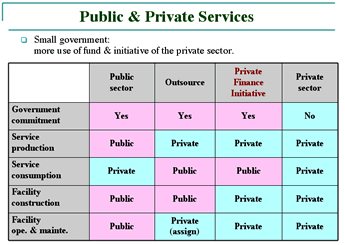
|
>Top 26 Social services in Japan:
- This is a map of who supplies fund, and who consumed services.
- As long as the public fund is limited, we must expand another quadrant of public service supported by private fund.
- This quadrant is easy to say, but difficult to act. A new type of legal systems are required to maintain community and people.
- Carbon dioxide transaction could be a typical one in this quadrant.
|
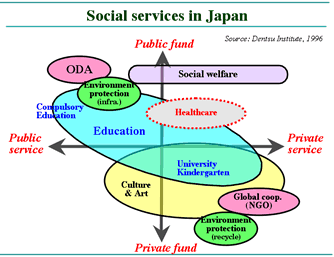
|
>Top 27. Type of Private Finance Initiative:
- Essence of PFI: What is PFI? Financially independent:
- public service licensed by government, such as
pay road, pay bridge, pay parking, tourist facilities.
- Purchase of service:
- government purchase the services operated by private sector, such as rubbish disposal, government office, school building, community hall.
Joint Venture:
- Joint Venture:
- J/V promoted by public & private sectors, such as
urban development, railway operation.
- Note:
- Started in early 1990s in UK, and induced in 1999 in Japan, aiming to construct first public hospitals in rural areas, then waste treatment plant, welfare and education facilities.
|
>Top 28. Three phases of modernization:
- This is Prof. Shumpei Kumon's illustration of three phases of modernization. (a fractal-like sigmoid)
- This chart received praises particularly from a Chinese professor showing keen interest.
|
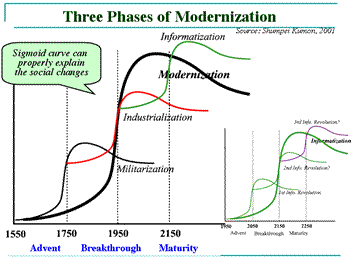
|
>Top 29. NGO/NPO Mapping:
- Various fuction and objects of NGOs/NPOs, mapping famous organizations.
|
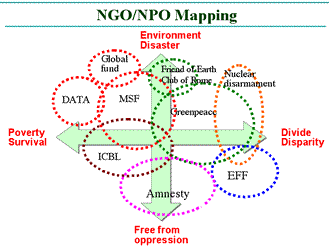
|
>Top 30. Typical NGO/NPO activities:
- Additional explanation about the function and objects of NGOs and NPOs.
- Amnesty (1961): Amnesty International Japan (1970)
- Club of Rome (1968):
- MSF (Medicins Sans Frontieres, 1971): MSF-Japan (1992)
- FoE (Friend of Earth, 1971?)
- Greenpeace (1971): Greenpeace-Japan (1989)
- EFF (Electronic Frontier Foundation, 1990) Blue Ribbon:
- Protect freedom in the digital world
- ICBL (International Campaign to Ban Landmines, 1992): ICBL-Japan (1998)
- DATA (2002): Debt, AIDS, Trade, Africa; support for Africa
- Make poverty history (White Band, 2005): Japan (2005)
- The Global Fund (2002): since Genova summit
- (Product) Red: to fight AIDS, Tuberculosis, & Malaria
- CND (Campaign for Nuclear Disarmament, 1958 UK)
- No More Hiroshimas, No More Nagasakis.
- JICA:
- JOCV (Japan Overseas Cooperation Volunteer, 1965)
- 82 countries, 29,906 staff (16,822 men, 12,414 women)
|
>Top 31. SWOTT anlysis of Japanese NGOs:
- This is a rough sketch of SWOT analysis of NGO of Japan.
- Quadrant viewpoint making SWOT analysis is useful; it gives not only viewpoint from the present, but also from future possibilities, both in optimistic as well as pessimistic observation.
- Strengh:
- various conventional experiences of social activities
- conventional know-how operating organizations (particularly from the experiences of private sector).
- Weakness:
- not enough funding
(less active donation)
- smaller public expenses (particularly educational expenses)
- week horizontal connection
- less publicity & acknowledgement
- Opportunity:
- quick actions by networked people (by social network)
- connections with common global isssues (particularly sensitive in peace issues)
- participation of baby-boomer generation having managerial & technical skills (within 2000).
- Threat:
- easy life-style living for the
present, not for the future
- trend of politically apathetic younger generation
- Aging society with less children & less grand children.
- Less sensitive about diversity (including women, foreigners, aged retired people)
|
>Top 32. ABCDEF Skills: Skills required for NGO/NPO
- Historically, in Asia, there was a famous ABCD enveloping attact to Japan in 1930s: by America, British, China, and Dutch colony in Asia.
- Here appears again, but totally differenct ABCDEF acronym.
- Actions research:
- data gathering, analysis, identification of problems, consultation with community, recommendations
- Business skills:
- planning, circular management, negotiation, marketing, bookkeeping, IT literacy, legal aspects
- Community organizing:
- community integration, facilitation, mobilization, role playing, evaluation, EQ (emotional intelligence quotient)
- Documentation & Information:
- clarification of value, communication skills including foreign languages, advocacy, networking,
- Education & training:
- use of media, OJT, teaching skills, group dynamics, self-learning kit, and patience as a leader
- Field knowledge & technology:
- agriculture, fishing, food, energy, health, handicrafts, education, trade, manufacturing, and small business know-how
|
>Top 33. Outline of IT Coordinators:
- Outline of IT Coordinators System in Japan, and the function of IT Coordinators.
- The author also became a IT Coordinator.
- IT Coordinators Association is a NPO, established in 2000 to support nationwide IT Coordinators in Japan.
|
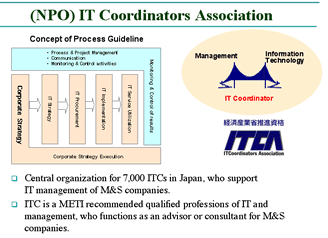
|
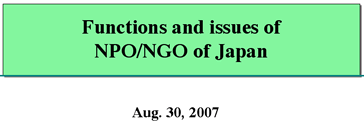







 We should consider globalization inside Japan.
We should consider globalization inside Japan.




